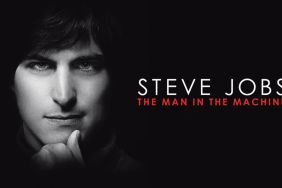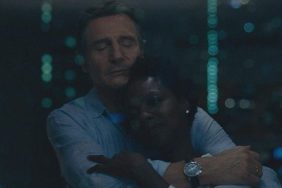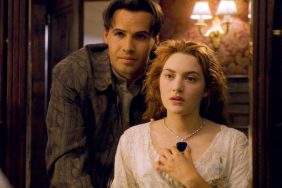
10 out of 10
Steve Jobs Cast:
Michael Fassbender as Steve Jobs
Kate Winslet as Joanna Hoffman
Seth Rogen as Steve Wozniak
Jeff Daniels as John Sculley
Katherine Waterston as Chrisann Brennan
Michael Stuhlbarg as Andy Hertzfeld
Makenzie Moss as Lisa Jobs (5 Years Old)
Perla Haney-Jardine as Lisa Jobs (19 Years Old)
Vanessa Ross as Elizabeth Ramos
Sarah Snook as Andrea Cunningham
John Ortiz as Joel Pforzheimer
Jackie Dallas as Flint Stage Manager
Adam Shapiro as Avie Tevanian
Directed by Danny Boyle
Story:
In 1984, Apple co-founder Steve Jobs (Michael Fassbender) introduced the Macintosh to a packed house of tech press in Cupertino, California. The personal computer would never be the same. Behind the scenes, Jobs was having issues, particularly with Chrisann Brennan (Katherine Waterston), the mother of his illegitimate daughter Lisa (Makenzie Moss) who wants money from the millionaire. He’s also pressured into keeping Apple’s staff happy including long-time friend and collaborator Steve Wozniak (Seth Rogen) and company CEO John Sculley (Jeff Daniels). Four years later, Jobs is preparing for another launch at his new company Next and ten years after that, he’s back at Apple with another important launch, and he still has issues to resolve including that of his own ego.
Analysis:
One thing not many people realize about me is that I’m a little bit of a computer expert. In fact, I earned a living setting up and fixing computers before I decided to write about movies, and I’ve been working on Apple brand computers going back to the mid-’80s. In fact, I wish you luck in finding another film critic who could literally take apart a Macintosh computer and put it back together (in working condition). Despite my background and experience and how much I know about the history of Apple from a tech standpoint, this review isn’t about me.
This is about Steve Jobs and specifically the new movie from Danny Boyle that puts Michael Fassbender in the unenviable role of playing Jobs at three important moments in his life. With another note-perfect screenplay from Aaron Sorkin that often harks back to his Oscar-winning work on The Social Network—ironically, David Fincher was at one point going to direct this movie, too—this is a different approach to telling Jobs’ story than the typical documentary or biopic, because it focuses specifically on three periods and a half dozen relationships. And yet, it still uses a three-act structure with each act based around the launch of one of Job’s products: The Macintosh in 1994, the Next Black Cube four years later and then the iMac in 1998 after he returned to Apple as its CEO. During this whole time, he has his trusty right hand Joanna Hoffman (Kate Winslet) by his side to help him navigate the slew of acquaintances who want an audience with him on these important days.
Who knows how many of these interactions really happened, even if the five or six people would theoretically be at all of these launches? It really doesn’t matter, because what they’re creating is grand theater, meant to show the relationships between this arrogant megalomaniac and the people who should be closest to him.
If Sorkin had actually included any of Jobs’ well-documented Apple demonstrations in the movie, it would have been far easier for Fassbender to create a direct imitation of the famous icon, but the film is more about what happens before the demos and backstage where only a few people got to see Jobs when not “in character.” Instead, it’s an interpolation culled from Jobs’ many public appearances, but Fassbender loses himself into the role in a way we’ve only seen from the greatest of actors including the many who have deservedly won Oscars doing so. If there’s anyone who doubts Fassbender as an actor at this point in his career, seeing him play a famous person in such a capacity should silence them forever.
The most important aspect of the film and its very heart and core is Jobs’ relationship with his illegitimate daughter Lisa, who he denied having fathered, and it allows Fassbender to have some scenes with two fantastic young actresses. Even at the age of 5, where Lisa is played by Makenzie Moss, it’s obvious that she’s clearly a chip off the old block (or maybe you can say that the apple doesn’t fall far from the Apple co-founder?), because she’s super smart and has a similar questioning attitude.
While the entire cast delivers on Sorkin’s script including Seth Rogen as “Woz” and Jeff Daniels as essentially his boss John Scully, it’s Kate Winslet who has the most screen time with Fassbender as she escorts Job from meeting to meeting while trying to keep him on schedule for the impending demonstrations. The relationship between Jobs and Hoffman offers the strongest arc, mainly because she’s one of the only people who can stand up to him (other than Lisa), but then there are other mini-arcs for each of the characters introduced and how their relationship with Jobs evolves over the course of 14 years. It leads to some of the finest dramatic moments of the year between Fassbender and the entire cast.
Sorkin’s screenplay is not only one of the best of the year but also of his career with so many great witticisms and interactions you’re immediately pulled into Job’s mindset of how he sees the world and interacts with those around him. If you know anything about Jobs already (either from any of the previous books or movies about him), you’ll appreciate the subtler references and nods thrown in to help expand upon Jobs as a multi-dimensional person but one with clear touchpoints, like his affinity for Dylan.
Some might be surprised Sorkin didn’t extend the movie into the introduction of the iPhone or Jobs’ losing battle with cancer, but the movie is already a home run and going into that territory would essentially be playing to the cheap seats, and it ends up being unnecessary.
Steve Jobs seems like a different kind of movie for director Danny Boyle as he veers away from his normal style of using innovative camera work and fast editing driven by the music. Maybe the only time we get that is during a montage that bridges the 1988 and 1998 sections of the film, but otherwise Boyle focuses on getting the best performances by his cast based on the script and not trying to take any of the spotlight away from them. If you can imagine last year’s Birdman without the technical flash but still equally as effective at using its characters and setting to keep things visually compelling, that might give you some idea what to expect. Granted, composer Daniel Pemberton’s ambient synth work probably owes more to the Oscar-winning score for The Social Network than anyone will admit, but it’s also quite effective at keeping things flowing.
The Bottom Line:
I knew within five minutes of watching Steve Jobs that I was watching my favorite movie of the year. Maybe it’s the Apple founder’s fabled “reality distortion field” working from the grave, but Steve Jobs is a damn near perfect effort with words and performances that will reign come Oscar time.
Steve Jobs will premiere as the Centerpiece of the 53rd New York Film Festival on October 4 before being released in New York and L.A. on October 9, expanding on October 16 and then nationwide on October 23.
Steve Jobs
-
Steve Jobs

-
Steve Jobs

-
Steve Jobs

-
Steve Jobs

-
Steve Jobs










